This is the German Army order of battle on the outbreak of World War I in August 1914.
Commanders and locations of the German Army
The overall commander of the Imperial German Army was Kaiser Wilhelm II. The Chief of the General Staff was Generaloberst Helmuth von Moltke the Younger, with General Hermann von Stein as Deputy Chief. The Departmental chiefs were Oberst Tappen (Operations Branch), Oberstleutnant Hentsch (Intelligence Branch), Major Nicolai (Secret Service), Oberst von Dommes (Political Section), Generalleutnant Siger (Field munitions), Major Thomsen (Air Service), Oberst Groner (Field Railways), General von Lauter(Foot Artillery), General von Claer was General of Engineers, and General von Schjerning (Medical Services). Generalmajor von Schoeler was Intendant-General (responsible for logistical supplies).[1]
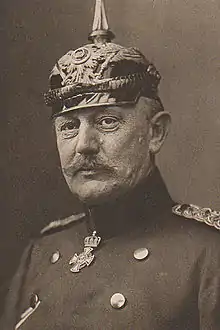 Helmuth von Moltke the Younger
Helmuth von Moltke the Younger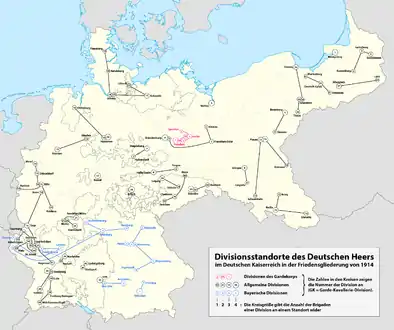 Location of the German divisions 1914
Location of the German divisions 1914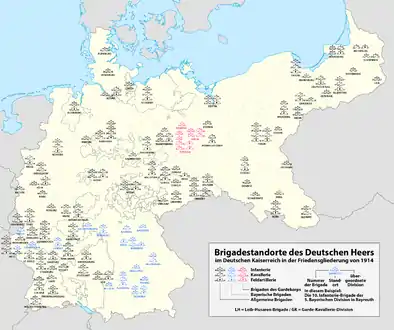 Location of the German brigades 1914
Location of the German brigades 1914
Homeland corps deployments (1871-1914)
During times of war in Germany, all military forces came under the direct command of the German Emperor, via Article 60 of the Constitution of the German Reich (1871). From 1871 to 1918, the forces of the Emperor included those of the kingdoms of Prussia, Bavaria, Saxony and Württemberg, with all other states commanded by, or merged with his Prussian army.
 Battle of the Frontiers - 2 August to 26 August 1914.
Battle of the Frontiers - 2 August to 26 August 1914. German corps areas 1914
German corps areas 1914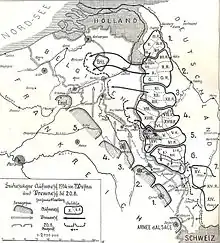 March in the West
March in the West Situation in East
Situation in East March Württ. Troops 1914
March Württ. Troops 1914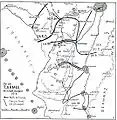 7th German Army in August 1914
7th German Army in August 1914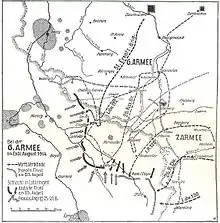 6th Army August 1914
6th Army August 1914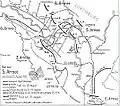 5th Army August 1914
5th Army August 1914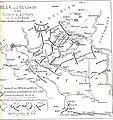 XIII. AK Longwy 1914
XIII. AK Longwy 1914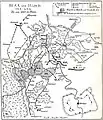 XIII. AK Maas 1914
XIII. AK Maas 1914 XIII. AK Argonne 1914
XIII. AK Argonne 1914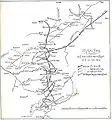 26th Kav.Brig 1914
26th Kav.Brig 1914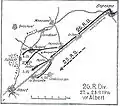 26th (Württ) and 28th Württ. Res Div. End September 1914
26th (Württ) and 28th Württ. Res Div. End September 1914 Lw-Regt. 122 Lorraine 1914
Lw-Regt. 122 Lorraine 1914 51st Ers.Brig 1914
51st Ers.Brig 1914 26th Inf Div. and 26th Cavalry Brig. 1914
26th Inf Div. and 26th Cavalry Brig. 1914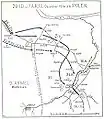 26th Inf.-Div. and FArt-Regt. 13 Poland 1914
26th Inf.-Div. and FArt-Regt. 13 Poland 1914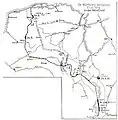 Württ. units at Western Front in late 1914
Württ. units at Western Front in late 1914 Württ. units at Eastern Front in late 1914
Württ. units at Eastern Front in late 1914
Western Front
Cavalry
Four independent cavalry corps served on the Western Front. These had the following order of battle:[2]
I Cavalry Corps (preceding 3rd Army)
Commander: General der Kavallerie Manfred Freiherr von Richthofen
Chief of Staff: Oberst von Raumer
- Guards Cavalry Division (General Adolf von Storch)
- 5th Cavalry Division (General Karl von Ilsemann)
II Cavalry Corps (preceding 1st and 2nd Armies)
Commander: General der Kavallerie Georg von der Marwitz
Chief of Staff: Major Hoffmann von Waldau
- 2nd Cavalry Division (General Friedrich FH von Krane)
- 4th Cavalry Division (General Otto von Garnier)
- 9th Cavalry Division (General Karl Hans von Bülow)
III Cavalry Corps (preceding 6th Army)
Commander: General der Kavallerie Rudolf Ritter von Frommel
Chief of Staff: Major von Meiß
- 7th Cavalry Division (General Ernst von Heydebreck)
- 8th Cavalry Division (General Günther Graf von der Schulenburg-Hehlen)
- Bavarian Cavalry Division (Generalleutnant Otto von Stetten)
IV Cavalry Corps (preceding 4th and 5th Armies)
Commander: General der Kavallerie Gustav Freiherr von Hollen
Chief of Staff: Oberstleutnant Otto von Brandenstein
- 3rd Cavalry Division (General Kurt von Unger)
- 6th Cavalry Division (General Egon Graf von Schmettow)
Each Cavalry Division consisted of 3 Brigades, each of 2 Cavalry Regiments (24 squadrons total), 3 horse artillery batteries (4 guns each) and an MG detachment (6 MGs).
First Army
1st Army had the following order of battle:[3]
Commander: Generaloberst Alexander von Kluck
Chief of Staff: Generalmajor Hermann von Kuhl
Oberquartiermaster: Oberst Walter von Bergmann
HQ: Grevenbroich, Germany
Strength: 320,000
II Corps
Commander: General der Infanterie Alexander von Linsingen
Chief of Staff: Oberst Hans von Hammerstein-Gesmold
- 3rd Infantry Division (Generalleutnant Kurt Eduard von Trossel)
- 4th Infantry Division (Generalleutnant Günther von Pannewitz)
III Corps
Commander: General der Infanterie Ewald von Lochow
Chief of Staff: Oberstleutnant Hans von Seeckt
- 5th Infantry Division (Generalleutnant Georg Wichura)
- 6th Infantry Division (Generalmajor Richard Herhudt von Rohden)
IV Corps
Commander: General der Infanterie Friedrich Bertram Sixt von Armin
Chief of Staff: Generalmajor Leo von Stocken
- 7th Infantry Division (Generalleutnant Johannes Riedel)
- 8th Infantry Division (Generalleutnant Georg Karl August Hildebrandt)
IX Corps
Commander: General der Infanterie Ferdinand von Quast
Chief of Staff: Oberstleutnant Hans Sydow
- 17th Infantry Division (Generalleutnant Arnold von Bauer)
- 18th Infantry Division (Generalleutnant Max von Kluge)
III Reserve Corps
Commander: General der Infanterie Hans von Beseler
Chief of Staff: Oberst Paul Meister
- 5th Reserve Division (Generalleutnant Richard Voigt)
- 6th Reserve Division (Generalleutnant Emil von Schickfus und Neudorf)
IV Reserve Corps
Commander: General der Artillerie Hans von Gronau
Chief of Staff: Oberstleutnant Friedrich von der Heyde
- 7th Reserve Division (Generalleutnant Bogislav Graf von Schwerin)
- 22nd Reserve Division (Generalleutnant Otto Riemann)
Other Forces
- 10th Mixed Landwehr Brigade (Werner von Lenthe)
- 11th Mixed Landwehr Brigade (Oberst Hans von Tippelskirch)
- 27th Mixed Landwehr Brigade (Viktor Dallmer)
- Pionier Regiment[4]
Second Army
2nd Army had the following order of battle:[5]
Commander: Generaloberst Karl von Bülow
Chief of Staff: Generalleutnant Otto von Lauenstein
Oberquartiermaster: Generalmajor Erich Ludendorff
Strength: 260,000
Guards Corps
Commander: General der Infanterie Karl von Plettenberg
Chief of Staff: Oberstleutnant Friedrich Graf von der Schulenburg
- 1st Guards Infantry Division (Generalleutnant Oskar von Hutier)
- 1st Guards Infantry Brigade (Generalmajor Friedrich Leopold von Kleist)
- 2nd Guards Infantry Brigade (Generalmajor Hans Karl Schach von Wittenau)
- 1st Guards Field Artillery Brigade (Generalmajor Friedrich von Buddenbrock)
- Leib-Garde-Husaren-Regiment (Oberst Georg von Brandenstein)
- 2nd Guards Infantry Division (Generalleutnant Arnold von Winckler)
- 3rd Guards Infantry Brigade (Generalmajor Viktor Albrecht)
- 4th Guards Infantry Brigade (Generalmajor Friedrich von Gontard)
- 2nd Guards Field Artillery Brigade (Generalmajor Joseph Trimborn)
- 2. Garde-Ulanen-Regiment (Oberstleutnant Leopold von Maltzahn)
VII Corps
Commander: General der Kavallerie Karl von Einem
Chief of Staff: Oberst Hans von Wolff
- 13th Infantry Division (Generalleutnant Kurt von dem Borne)
- 14th Infantry Division (Generalleutnant Paul Fleck)
X Corps
Commander: General der Infanterie Otto von Emmich
Chief of Staff: Oberst Gustav von der Wenge Graf von Lambsdorff
- 19th Infantry Division (Generalleutnant Max Hofmann)
- 20th Infantry Division (Generalleutnant Alwin Schmundt)
Guards Reserve Corps
Commander: General der Artillerie Max von Gallwitz
Chief of Staff: Oberst Paul von Barttenwerffer
- 3rd Guards Infantry Division[6] (Generalleutnant Henning von Bonin)
- 5th Guards Infantry Brigade (Generalmajor Nikolaus von Below)
- 6th Guards Infantry Brigade (Generalmajor Friedrich von Friedeburg)
- 3rd Guards Reserve Field Artillery Brigade (Generalmajor Hans Willibald Graf von Schweinitz und Krain Frh von Kauder)
- Guards-Reserve-Ulanen-Regiment (Major Johan Cesar Godefroy-Faerber)
- 1st Guards Reserve Division (Generalmajor Viktor Albrecht)
- 1st Guards Reserve Brigade (Generalmajor Hans Frh von Langermann und Erlenkamp)
- Garde-Reserve-Infanterie-Regiment Nr. 1 (Oberstleutnant Max Friedrich von Schlechtendal)
- Garde-Reserve-Infanterie-Regiment Nr. 2 (Oberstleutnant Wigand von Cramer)
- Garde-Reserve-Jäger-Bataillon (Major von Gluszewski)
- 15th Reserve Infantry Brigade (Oberst Hans von Below)
- Reserve-Infanterie-Regiment Nr. 64 (Oberstleutnant Rudolf von Cramer)
- Reserve-Infanterie-Regiment Nr. 93 (Oberst von Jena)
- Guards Reserve Field Artillery Brigade (Generalmajor Louis Mertens)
- Garde-Reserve-Feldartillerie-Regiment (Oberstleutnant von Bülow)
- 3. Garde-Reserve-Feldartillerie-Regiment (Oberstleutnant Goling)
- Garde-Reserve-Dragoner-Regiment (Major von Hofmann)
- 1st Guards Reserve Brigade (Generalmajor Hans Frh von Langermann und Erlenkamp)
VII Reserve Corps
Commander: General der Infanterie Hans von Zwehl
Chief of Staff: Oberstleutnant Hans Hesse
- 13th Reserve Division (Generalleutnant Alfred von Kühne)
- 25th Reserve Infantry Brigade (Generalleutnant Andreas Wilhelm von Harbou)
- Reserve-Infanterie-Regiment Nr. 13 (Oberstleutnant Johann Edler und Ritter von Braun)
- Reserve-Infanterie-Regiment Nr. 56 (Oberstleutnant von Goetze)
- 28th Reserve Infantry Brigade (Generalmajor Karl Johann Neuhauß)
- Reserve-Infanterie-Regiment Nr. 29 (Oberstleutnant Eben)
- Reserve-Infanterie-Regiment Nr. 37 (Oberstleutnant von Flottwell)
- Reserve-Jäger-Bataillon Nr. 7 (Hauptmann von der Groeben)
- Reserve-Feldartillerie-Regiment Nr. 13 (Oberstleutenant Reinecke)
- Reserve-Husaren-Regiment Nr. 5 (Major Hugo von Kayser)
- 25th Reserve Infantry Brigade (Generalleutnant Andreas Wilhelm von Harbou)
- 14th Reserve Division (Generalleutnant Wolfgang von Unger)
- 28th Infantry Brigade (Oberst Hermann von Ziegesar)
- Niederrheinisches Füsilier-Regiment Nr. 39 (Oberst Walter von Schönberg)
- 8. Lothringisches Infanterie-Regiment Nr. 159 (Obserst Karl von Kraewel)
- 27th Reserve Infantry Brigade (Generalleutnant Edwin Sunkel)
- Reserve-Infanterie-Regiment Nr. 16 (Oberstleutnant Siegener)
- Reserve-Infanterie-Regiment Nr. 53 (Oberstleutnant Bötterling)
- Reserve-Feldartillerie-Regiment Nr. 14 (Major Wendt)
- Reserve-Husaren-Regiment Nr. 8 (Major Heyne)
- 28th Infantry Brigade (Oberst Hermann von Ziegesar)
X Reserve Corps
Commander: General der Infanterie Günther Graf von Kirchbach
Chief of Staff: Oberst Gottfried Marquard
- 2nd Guards Reserve Division (Generalleutnant Richard von Süßkind)
- 19th Reserve Division (Generalleutnant Max von Bahrfeldt)
Other Forces
Third Army
3rd Army had the following order of battle:[11]
Commander: Generaloberst Max von Hausen
Chief of Staff: Generalmajor Ernst von Hoeppner
Oberquartiermaster: Generalmajor Max Leuthold
Commander of Pioniere: Generalmajor Franz Adams
Strength: 180,000
XI Corps
Commander: General der Infanterie Otto von Plüskow
Chief of Staff: Oberst Traugott von Sauberzweig
- 22nd Infantry Division (Generalmajor Karl Dieffenbach)
- 43rd Infantry Brigade (Generalmajor Walter von Hülsen)
- 44th Infantry Brigade (Generalmajor Theodor Nordbeck)
- 22nd Field Artillery Brigade (Generalmajor Karl Max Gronau)
- 38th Infantry Division (Generalleutnant Ernst Wagner)
- 76th Infantry Brigade (Generalmajor Fritz von Versen)
- 83rd Infantry Brigade (Generalmajor Thilo von Hanstein)
- 38 Field Artillery Brigade (Generalmajor Otto Krahmer)
- 6th (Brandenburg) Cuirassiers "Emperor Nicholas I of Russia" (Oberst Alexander von Poten)
XII (1st Royal Saxon) Corps
Commander: General der Infanterie Karl d'Elsa
Chief of Staff: Oberstleutnant Hans von Eulitz
- 23rd Infantry Division (Generalleutnant Karl von Lindeman)
- 32nd Infantry Division (Generalleutnant Horst Edler von der Planitz)
XIX (2nd Royal Saxon) Corps
Commander: General der Kavallerie Maximilian von Laffert
Chief of Staff: Oberstleutnant Georg Frotscher
XII (Royal Saxon) Reserve Corps
Commander: General der Artillerie Hans von Kirchbach
Chief of Staff: Oberstleutnant Konrad von Koppenfels
Other Forces
Fourth Army
4th Army had the following order of battle:[14]
Commander: Generaloberst Albrecht, Duke of Württemberg
Chief of Staff: Generalleutnant Walther von Lüttwitz
Oberquartiermaster: Oberst Georg Weidner
Strength: 180,000
VI Corps
Commander: General der Infanterie Kurt von Pritzelwitz
Chief of Staff: Oberstleutnant Friedrich von Derschau
- 11th Infantry Division (Generalleutnant Richard von Webern)
- 12th Infantry Division (Generalleutnant Martin Chales de Beaulieu)
VIII Corps
Commander: Generalleutnant Erich Tülff von Tschepe und Weidenbach
Chief of Staff: Oberst August von Cramon
- 15th Infantry Division (Generalleutnant Julius Riemann)
- 16th Infantry Division (Generalleutnant Georg Fuchs)
XVIII Corps
Commander: General der Infanterie Dedo von Schenck
Chief of Staff: Oberstleutnant Leberecht von Blücher
- 21st Infantry Division (Generalmajor Ernst von Oven)
- 25th Infantry Division (Generalmajor Viktor Kühne)
VIII Reserve Corps
Commander: General der Infanterie Wilhelm Freiherr von Egloffstein
Chief of Staff: Oberst Carl Julius Georg Buchholtz
- 15th Reserve Division (Generalleutnant Eberhard von Kurowski)
- 16th Reserve Division (Generalleutnant Wilhelm Mootz)
XVIII Reserve Corps
Commander: Generalleutnant Kuno von Steuben
Chief of Staff: Oberst Fritz von Studnitz
- 21st Reserve Division (Generalleutnant Hermann von Rampacher)
- 25th Reserve Division (Generalleutnant Alexander Torgany)
Other Forces
Fifth Army
5th Army had following Order of Battle:[17]
Commander: Generalmajor Wilhelm, Crown Prince of Germany
Chief of Staff: Generalleutnant Konstantin Schmidt von Knobelsdorf
Oberquartiermaster: Generalmajor Rogalla von Bieberstein
HQ: Saarbrücken, Germany
Strength: 200,000
V Corps
Commander: General der Infanterie Hermann von Strantz
Chief of Staff: Oberstleutnant Hans von Kessel
- 9th Infantry Division (Generalleutnant Eduard von Below)
- 10th Infantry Division (Generalleutnant Robert Kosch)
XIII (Royal Württemberg) Corps
Commander: General der Infanterie Max von Fabeck
Chief of Staff: Oberstleutnant Friedrich Karl von Loßberg
- 26th Infantry Division (Generalleutnant Wilhelm Karl, Duke of Urach)
- 27th Infantry Division (Generalleutnant Franz Graf von Pfeil und Klein-Ellguth)
XVI Corps
Commander: General der Infanterie Bruno von Mudra
Chief of Staff: Oberst Rudolf von Borries
- 33rd Infantry Division (Generalleutnant Franz von Reitzenstein)
- 34th Infantry Division (Generalleutnant Walter von Heinemann)
V Reserve Corps
Commander: General der Infanterie Erich von Gündell
Chief of Staff: Oberstleutnant Ernst von Stockhausen
- 9th Reserve Division (Generalleutnant Hans von Guretzky-Cornitz)
- 10th Reserve Division (Generalleutnant Hermann von Wartenberg)
VI Reserve Corps
Commander: General der Infanterie Konrad von Goßler
Chief of Staff: Oberst Richard von Rath
- 11th Reserve Division (Generalmajor Karl Suren)
- 12th Reserve Division (Generalleutnant Hinko von Lüttwitz)
Other Forces
- Senior Landwehr Commander 2 (2nd Landwehr Division) (Generalleutnant Adolf Franke)
- 43rd Mixed Landwehr Brigade (Generalleutnant Friedrich Wilhelm von der Lippe)
- 45th Mixed Landwehr Brigade (Generalmajor Ludolf von Bosse)
- 53rd Mixed Landwehr Brigade (Generalmajor Hermann von Oßwald)
- 9th Bavarian Mixed Landwehr Brigade (Generalmajor Bernhard Kießling)
- 13th Mixed Landwehr Brigade (Generalmajor Georg Saenger)
- 4 Mortar Battalions[18]
- 2 Pionier Regiments[19]
Sixth Army
6th Army had the following Order of Battle:[20]
Commander: Generaloberst Rupprecht, Crown Prince of Bavaria
Chief of Staff: Generalmajor Konrad Krafft von Dellmensingen
Oberquartiermaster: Generalmajor Bernhard von Hartz
HQ: Saint-Avold, France
Strength: 220,000
XXI Corps
Commander: General der Infanterie Fritz von Below
I Bavarian Corps
Commander: General der Infanterie Oskar Ritter und Edler v. Xylander
II Bavarian Corps
Commander: General der Infanterie Karl Ritter von Martini
III Bavarian Corps
Commander: General der Kavallerie Ludwig Freiherr von Gebsattel
I Bavarian Reserve Corps
Commander: General der Infanterie Karl Ritter von Fasbender
Other Forces
- Guards Ersatz Division
- 4th Ersatz Division
- 8th Ersatz Division
- 10th Ersatz Division
- 5th Bavarian Mixed Landwehr Brigade
- 3 Mortar Battalions[21]
- Heavy Coastal Mortar Battery[22]
- Heavy Coastal Gun Battery[23]
- 2 Pionier Regiments[24]
Seventh Army
7th Army had the following Order of Battle:[25]
Commander: Generaloberst Josias von Heeringen
Chief of Staff: Generalleutnant Karl von Hänisch
Oberquartiermeister: Generalmajor Ernst von Zieten
XIV Corps
Commander: General der Infanterie Ernst Freiherr von Hoiningen gen. Huene
Chief of Staff: Oberstleutnant Gottfried von Brauchitsch
XV Corps
Commander: General der Infanterie Berthold von Deimling
Chief of Staff: Oberst Wilhelm Wild
XIV Reserve Corps
Commander: General der Artillerie Richard von Schubert
Chief of Staff: Oberstleutnant Bernhard Bronsart von Schellendorff
Other Forces
- 19th Ersatz Division
- Bavarian Ersatz Division
- 60th Mixed Landwehr Brigade
- Upper Rhine Fortifications
- 55th Mixed Landwehr Brigade
- 110th Reinforced Landwehr Infantry Regiment
- 1st Bavarian Mixed Landwehr Brigade
- 2nd Bavarian Mixed Landwehr Brigade
Eastern Front
Eighth Army
8th Army had the following order of battle:[26]
Commander: Generaloberst Maximilian von Prittwitz.
Chief of Staff: Generalmajor Georg von Waldersee
Oberquartiermaster: Generalmajor Paul Grünert
HQ: Marienburg, Germany
Strength: 225,000
I Corps
Commander: Generalleutnant Hermann von François
XVII Corps
Commander: General der Kavallerie August von Mackensen
XX Corps
Commander: General der Infanterie Friedrich von Scholtz
I Reserve Corps
Commander: Generalleutnant Otto von Below
Landwehr Corps
Commander: General der Infanterie Remus von Woyrsch
- Senior Landwehr Commander 3 (3rd Landwehr Division)
- 17th Landwehr Infantry Brigade
- 18th Landwehr Infantry Brigade
- Senior Landwehr Commander 4 (4th Landwehr Division)
- 22nd Landwehr Infantry Brigade
- 23rd Landwehr Infantry Brigade
- 2nd Mixed Landwehr Brigade
- 6th Mixed Landwehr Brigade
- 70th Mixed Landwehr Brigade
Other Forces
Army of the North
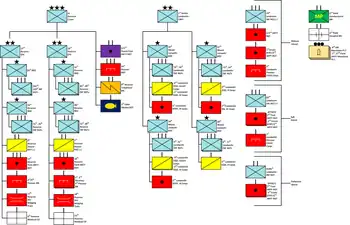
IX Reserve Corps is also known as the Army of the North was held back in Schleswig in case of British landings; moved up in late August as part of 1st Army.
The North Army had following order of battle:[27]
Commander: General der Infanterie Max von Boehn
Chief of Staff: Oberst Paulus von Stolzmann
- 17th Reserve Division (Generalleutnant Gustav Wagener)
- 18th Reserve Division (General der Infanterie Karl Wilhelm von Gronen)
- Senior Landwehr Commander 1 (1st Landwehr Division)
- 33rd Mixed Landwehr Brigade
- 34th Mixed Landwehr Brigade
- 37th Mixed Landwehr Brigade
- 38th Mixed Landwehr Brigade
- North Sea Islands
Central Reserves and Border Fortresses
- Strassburg
- 30th Reserve Division
- 60th Reserve Infantry Brigade
- 3rd Bavarian Reserve Infantry Brigade
- 10th Bavarian Reserve Infantry Brigade
- 30th Reserve Division
- Metz
- 33rd Reserve Division
- 8th Bavarian Infantry Brigade
- 66th Reserve Infantry Brigade
- Reserve Infantry Regiment Metz
- 33rd Reserve Division
- Thorn
- 35th Reserve Division
- 5th Landwehr Infantry Brigade
- 20th Landwehr Infantry Brigade
- 35th Reserve Division
- Königsberg
- 9th Landwehr Infantry Brigade
- Ersatz Infantry Brigade Königsberg
- Posen
- 19th Landwehr Infantry Brigade
- Graudenz
- Provisional 69th Infantry Brigade
See also
Notes
- ↑ "OHL - Supreme Army Command". prussianmachine.com. Retrieved 2021-12-08.
- ↑ "Hoehere Kavallerie-Kommandeure". prussianmachine.com. Retrieved 2022-02-21.
- ↑ "Imperial German First Army". prussianmachine.com. Retrieved 2022-02-14.
- ↑ expansion of pre-war 18th Btn
- ↑ "Imperial German Second Army". prussianmachine.com. Retrieved 2022-02-12.
- ↑ Given by Edmonds as "3rd Guard Reserve Division".
- ↑ II & III Btns, 4th Foot Regt; I & II Btns, 9th Foot Regt
- ↑ II Btn, 9th Reserve Foot Regt
- ↑ 1st & 5th Btys
- ↑ expansion of pre-war 24th & 25th Btns
- ↑ "Imperial German Third Army". prussianmachine.com. Retrieved 2022-02-15.
- ↑ III Btn, 1st Foot Regt
- ↑ expansion of pre-war 23rd Btn
- ↑ "Imperial German Fourth Army". prussianmachine.com. Retrieved 2022-02-15.
- ↑ II & III Btns, 7th Foot Regt
- ↑ expansion of pre-war 30th Btn
- ↑ "Imperial German Fifth Army". prussianmachine.com. Retrieved 2022-02-17.
- ↑ I & II Btns, 6th Foot Regt; II & III Btns, 12th Foot Regt;
- ↑ expansion of pre-war 20th & 29th Btns
- ↑ "Imperial German Sixth Army". prussianmachine.com. Retrieved 2022-02-17.
- ↑ II Btn, 3rd Bavarian Foot Regt; II & III Btns, 18th Foot Regt
- ↑ 2nd Bty
- ↑ 1st Bty
- ↑ expansion of pre-war 19th & 4th Bavarian Btns
- ↑ "Imperial German Seventh Army". prussianmachine.com. Retrieved 2022-02-17.
- ↑ "Eighth Field Army". prussianmachine.com. Retrieved 2022-02-15.
- ↑ "Nord-Armee". prussianmachine.com. Retrieved 2022-02-17.
Sources
- Appendix 6: Order of battle of the German Armies. In: History of the Great War: Military Operations, France and Belgium 1914, by J. E. Edmonds. Macmillan & Co., London, 1922.
- Appendix 1: The Field Army, 17 August 1914. In: Imperial German Army 1914-18: Organisation, Structure, Orders-of-Battle, by Hermann Cron. Helion & Co., 2002.